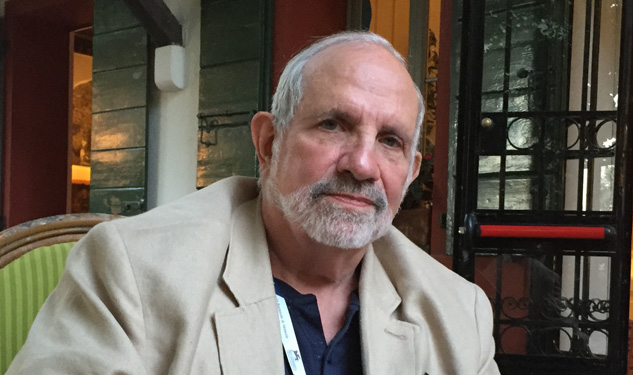
- Festivals
De Palma Celebrated In Venice
There are certain American directors that are more appreciated overseas than at home. In countries like France or Italy some filmmakers like Jerry Lewis or John Landis, have a cult status that they never quite attained at home. Brian De Palma, it’s safe to say, falls into the category of those whose works have garnered a faithful critical following in Europe that they often failed to in the U.S. That fact was plainly obvious here when the New York director was given the “Jaeger Le Coutre Glory to the Filmmaker” special award and met with a warm standing ovation by press and public alike.
The 75 year-old New Jersey native has had a remarkable career marked by a singular passion for cinema. A member of the “New Hollywood” generation with directors such as Scorsese, Coppola, Lucas, Spielberg, Carpenter and John Milius, De Palma nevertheless forged a thoroughly original path in American movies. In films like Carrie, Sisters, Dressed to Kill, Blow Out and Scarface, De Palma, who originally was trained in physics and computer science at Columbia University, has been credited with a singular vision born of an appreciation of French nouvelle vague and Hollywood classics like Orson Welles and Alfred Hitchcock. The Venice Festival also featured the premiere of De Palma, a new documentary by Jake Paltrow and Noah Baumbach who shot 30 hours of conversations with the director and edited what amounts to a definitive interview with one of American cinema’s true originals, a film on directors talking about directing, ideally modeled on the classic interview-book by Francois Truffaut on Alfred Hitchcock.
The three directors met the press together in Venice. Here are excerpts from the conversation.
Jake Paltrow: The project grew out of a sense of the importance of the conversations we were already having. We sensed that we were talking about film in a different way and we realized how valuable our conversations were. We wanted to record them without modifying
that mood.
Noah Baumbach: We wanted our own relationship, the intimacy of our own friendship to be part of the narrative.
De Palma: It was very casual. Just sit down and talk; they would ask me questions in Jake’s living room over a period of several weeks, I just had to wear the same blue shirt every day. This was five years ago. The great thing is how they were able to edit out the questions and just use film clips.
You exhibit a surprising amount of irony in your interview… De Palma: If you’re in this business you better have a sense of humor because the reaction to the films is usually the opposite of what you’d expect. You might think you’ve done a small film and people will really like it, or maybe you think you’ve finally done your masterwork and it fails miserably. You also have to have the will to persist. You have to keep going no matter what anyone says. You have to have talent, persistence and luck to succeed.
Why were you drawn to De Palma as a subject? Noah Baumbach: Brian makes personal movies and those are the ones I respond to. He is a wonderful director, writer and filmmaker, but above all they are so “him”, they’re personal and I try to make personal movies too so I feel that connection with Brian.
Jake Paltrow: For me he was one of the few directors who put his imprint on me, insofar as using visual images. As you grow up and become a filmmaker, sometimes you are almost surprised to discover the imprint his films left on you.
De Palma: When I started, I was associated with a group of young filmmakers. In the 70s we would talk about film and read each other’s scripts, we helped each other out. Then every one got kind of big and went their separate ways, and I miss that. 20 years later with Noah and Jake and Wes Anderson we found each other in New York and stared a new group. (…) It’s a great thing because only other directors can truly understand what you go through.
Have you considered working in TV like so many other directors? De Palma: I had a very bad experience with an HBO project. I find TV executives are very intrusive. I never had so many notes on a script I developed for Al Pacino on the Joe Paterno story. So many notes that they made it unworkable. You’ve got to understand, TV is producer- and writer-medium; they run the show while the directors they bring in are interchangeable. And if you can tell the difference between one episode and another, God bless you.

